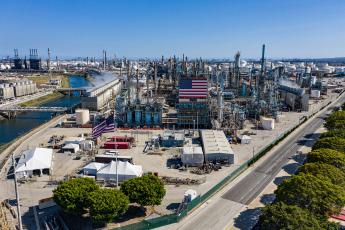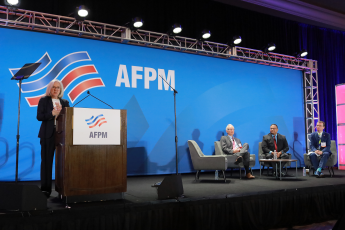Progress report on the global plastics treaty negotiations
AFPM recently participated in the fourth session of the United Nations’ (“UN”) negotiations for a global plastics agreement in Ottawa, Canada (INC-4). AFPM supports the UN’s ambition to eliminate additional plastic pollution. To get there, we need to accelerate a circular economy where plastic is sustainably reused or recycled instead of discarded, enabled by a global agreement that unlocks industry innovation and global investment in plastics circularity and waste management.
AFPM Honors Refining and Petrochemical Facilities Demonstrating Outstanding Safety
WASHINGTON, D.C. — The American Fuel & Petrochemical Manufacturers (AFPM) is proud to announce the winners of the 2023 Annual Safety Awards, considered the refining and petrochemical industries’ premier safety awards. They are part of a comprehensive program developed by the AFPM Safety and Health Committee to promote safe operations in our industries and recognize facilities that have outstanding occupational and process safety performance.
AFPM hits airwaves with new ads calling for Congress to overturn Biden EPA gas car ban
WASHINGTON, D.C. — Today, the American Fuel & Petrochemical Manufacturers (AFPM) is launching a series of new ads across nine states urging key United States Senators and Congressional Representatives to vote to overturn the Biden administration’s newly finalized regulation that will ban most new gas cars by 2032.
UN Intergovernmental Negotiating Committee makes progress on Plastic Waste Agreement, but work remains
Ottawa, Canada — As the fourth session of the United Nation’s Intergovernmental Negotiating Committee (INC-4) to create a global agreement on plastic pollution concluded Monday in Ottawa, AFPM released the following statement.
AFPM responds to STB’s final rule addressing reciprocal switching
WASHINGTON, D.C. — Today, Rob Benedict, AFPM Vice President of Petrochemicals and Midstream, issued the following statement welcoming the U.S. Surface Transportation Board’s (STB) long-awaited reciprocal switching final rulemaking.
AFPM releases 4th edition Sustainability Report
AFPM released the 4th edition of the Sustainability Report. This report highlights the myriad of examples of the work of AFPM members to deliver on their commitment to sustainably provide the critical fuel and petrochemical products that growing global populations need to thrive.
Highlights from AFPM’s 2024 International Petrochemical Conference
This year’s AFPM International Petrochemical Conference (IPC) showcased the people, policies and trends shaping the future of the global petrochemical industry. Here’s a look at some of the many memorable moments.
Statement on Senate EPA regulatory funding vote
WASHINGTON, D.C. — AFPM President and CEO Chet Thompson today issued the following statement after the United States Senate voted down a measure to defund EPA’s new regulation that will ban most new gas cars in less than a decade.
5 key takeaways from the 2024 AFPM Annual Meeting
Dallas was abuzz recently with more than a thousand refining and petrochemical industry leaders and top names from the worlds of news, politics and global economics convening for AFPM’s 2024 Annual Meeting. With the contentious 2024 election season, massive regulatory onslaught out of Washington, D.C., and the ever-changing and rebalancing global markets all discussed at the event, five key themes stood out.









